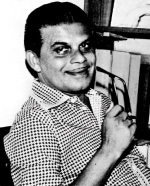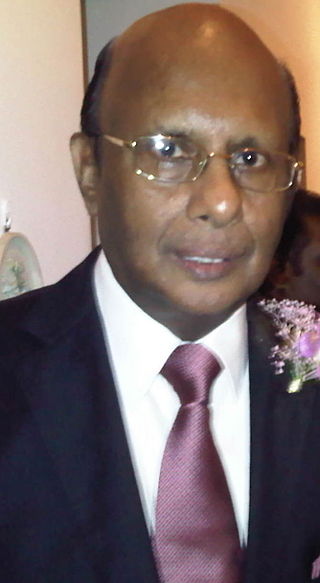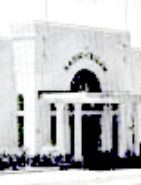
Vernon Corea was a pioneer radio broadcaster with 45 years of public service broadcasting both in Sri Lanka and the UK. He joined Radio Ceylon, South Asia's oldest radio station, in 1956 and later the Sri Lanka Broadcasting Corporation. During his time he presented some of the most popular radio shows in South Asia, including The Maliban Show, Dial-a-Disc, Holiday Choice, Two For the Money, Take It Or Leave It, Saturday Stars, To Each His Own, Kiddies Corner, and Old Folks at Home. He was well known not only in Sri Lanka, but right across the Indian Sub-Continent from the late 1950s to the 1970s – this was in the heyday of Radio Ceylon, the oldest radio station in South Asia.
Radio Ceylon is a radio station based in Sri Lanka and the first radio station in Asia. Broadcasting was started on an experimental basis by the colonial Telegraph Department in 1923, just three years after the inauguration of broadcasting in Europe.
London Sounds Eastern was one of the most popular ethnic minority radio programs on the BBC. It was presented by Vernon Corea and produced by Keith Yeomans.

The Sri Lanka Broadcasting Corporation (SLBC) (Sinhala: ශ්රී ලංකා ගුවන් විදුලි සංස්ථාව, Shrī Lankā Guvan Viduli Sansthāva, Tamil: இலங்கை ஒலிபரப்புக் கூட்டுத்தாபனம், Ilangkai Oliparappuk Kūṭṭuttāpaṉam) came into existence on 5 January 1967 when Radio Ceylon became a public corporation. Dudley Senanayake who was the Prime Minister of Ceylon in 1967 ceremonially opened the newly established Ceylon Broadcasting Corporation along with Minister Ranasinghe Premadasa and the Director-General of the CBC, Neville Jayaweera. The first board of Directors of CBC consisted of Mr Neville Jayaweera (CCS), Mr A. L. M. Hashim, Mr Dharmasiri Kuruppu, Mr K.A.G. Perera and Mr Devar Surya Sena. After the first board meeting, it was decided unanimously to appoint the chairman, Mr Jayaweera, as the new Director-General.
"Gilly Gilly Ossenfeffer Katzenellen Bogen by the Sea" is a popular song written by Al Hoffman and Dick Manning and published in 1954. It was a hit in 1954 in both the United States and United Kingdom, albeit for different artists.
Greg Roskowski was an announcer of Radio Ceylon during the height of the station's popularity in the 1950s in the Indian Subcontinent. Roskowski, born of a Japanese mother and a Polish father, was the booming voice of Radio Ceylon's morning radio programs.

Nihal Bhareti was a popular radio announcer with the Sri Lanka Broadcasting Corporation in Colombo. He joined Radio Ceylon in the 1960s. His mellow voice attracted hundreds of fans in Sri Lanka as well as on the Indian sub-continent.

Karunaratne Abeysekera was one of Sri Lanka's most famous Sinhala broadcasters. He was also a poet and songwriter and was widely admired for his excellent command of Sinhala.
Edward Harper was a British engineer who travelled to Colombo in 1921 to work in the Ceylon Telegraph Department. Harper was appointed Chief Engineer. He had an innovative mind and his passion was broadcasting. Edward Harper is known as the 'Father of Broadcasting,' in Ceylon.

Clifford R. Dodd was an administrator and radio expert, with twenty years experience in broadcasting in Australia, before he arrived in Sri Lanka. He was sent by the Australian Government under the Colombo Plan to work in Radio Ceylon. He was appointed Director of the newly formed Commercial Service of Radio Ceylon.
Timothy Navaratnam Horshington was a pioneering broadcaster of Radio Ceylon, the oldest radio station in South Asia. Horshington was one of the earliest Tamil announcers to be appointed to the panel of announcers in the 1950s by Livy Wijemanne and Clifford Dodd. He was very popular with listeners on the island - Ceylonese enjoyed listening to his mellow voice over Radio Ceylon - the radio station ruled the airwaves in the 1950s and 1960s in South Asia.
Christopher Arthur Greet was an actor and radio presenter. He is best known for his work alongside Victoria Wood in the 1998 BBC comedy series dinnerladies.
S. P. Mylvaganam was a Sri Lankan radio broadcaster. He was the first Tamil language announcer for the Commercial Service of Radio Ceylon. He had fans across Sri Lanka and India.
Elmo Fernando was a popular announcer with Radio Ceylon and subsequently the Ceylon Broadcasting Corporation. Fernando was an excellent reader of the news. He joined Radio Ceylon, the oldest radio station in South Asia at a time when it was known as the 'King of the Airwaves' in the 1950s and 1960s. Millions tuned into the station from across the Indian sub-continent. When he was at Radio Ceylon he was mentored by the veteran broadcaster Vernon Corea.

Vijaya Corea is a radio and television broadcaster and one of Sri Lanka's most well known media personalities. Corea is a household name in Sri Lanka, synonymous with broadcasting and show business for over four decades, and has often been referred to as Sri Lanka's No. 1 Compere.
Earle Douglas (Dougie) Meerwald was a pioneering Ceylonese musician. Dougie Meerwald was the vocalist of one of the leading Ceylonese swing and dance bands of the early 1950s - The Manhattans. Western popular music and dance band music was all the rage in South Asia after World War II and Ceylon was no exception.
Desmond Kelly is a Ceylonese musician who has entertained in Sri Lanka and in Australia. He was born in Colombo in 1936.
Owen de Abrew was one of Sri Lanka's leading ballroom dance personalities, he was known as the 'King of Ballroom dancing' in Colombo.
Kanda Surinduni is a Sri Lankan song composed by Clarence Wijewardena. It was originally performed by the Super Golden Chimes with Wijewardene at vocals in the mid-1970s.

Piyaneni is a classic Sri Lankan pop song composed by the Sri Lankan musician, Clarence Wijewardena. It is a tribute in song to the love of a father. Wijeywardena used the rhythmic pattern of the Bossa nova for 'Piyaneni'.








